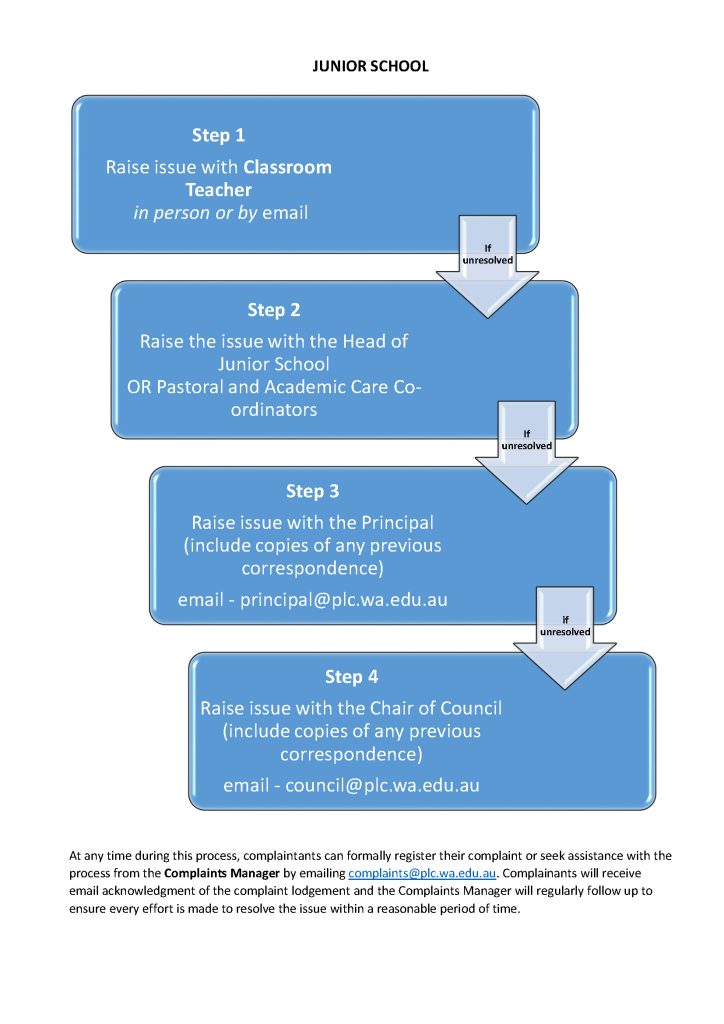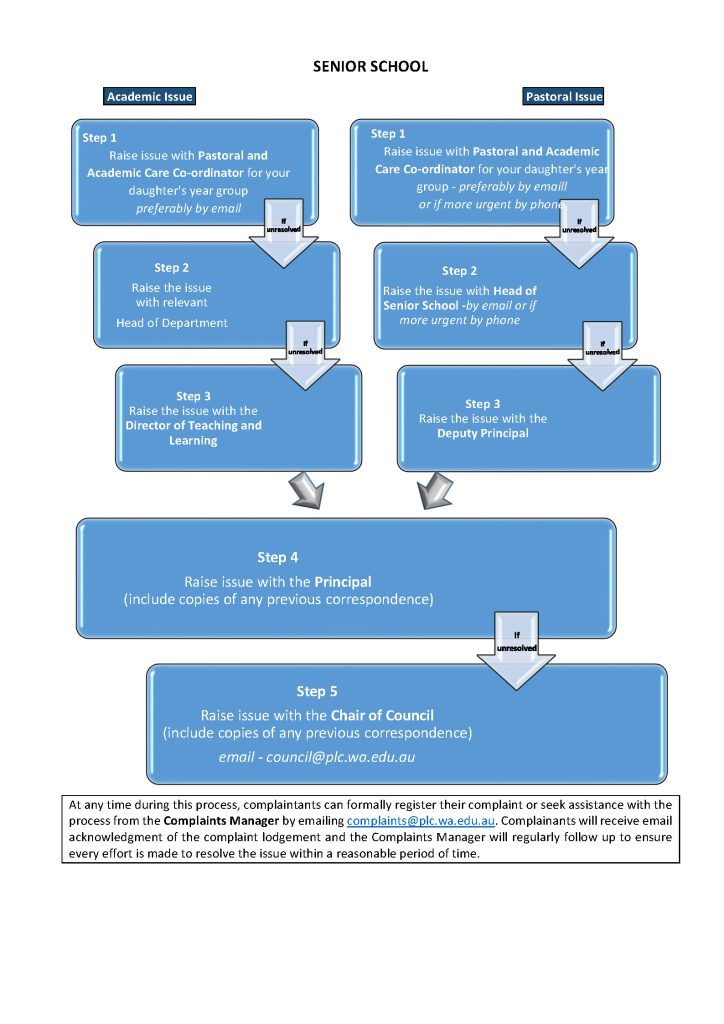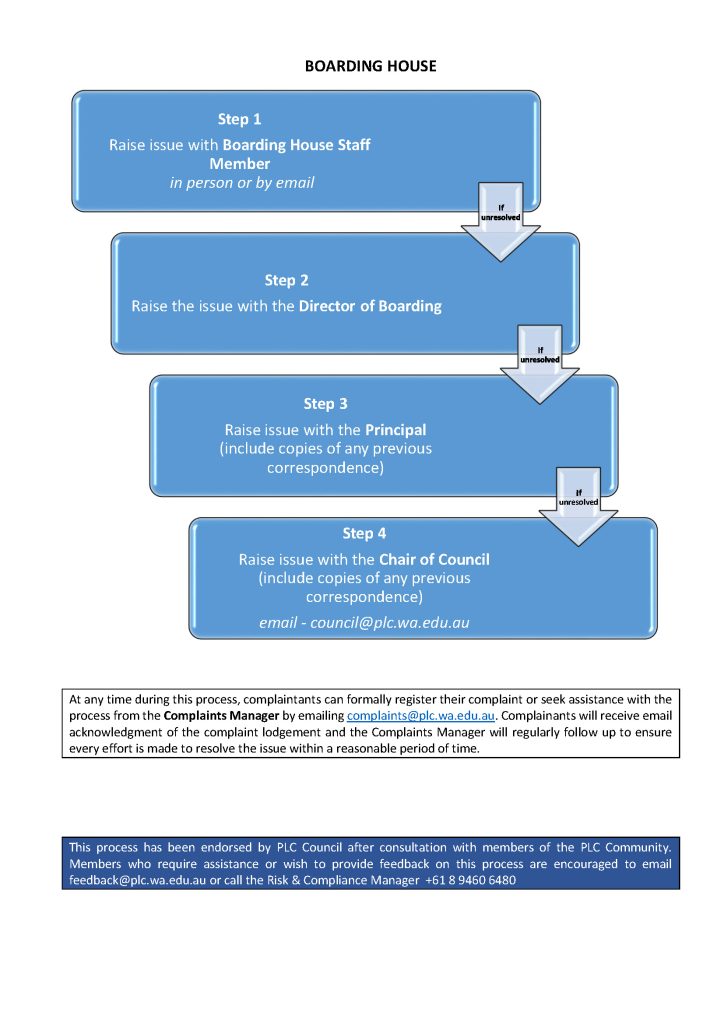1. Policy
Presbyterian Ladies’ College (PLC) is committed to child safety and wellbeing and to providing an environment where diversity is encouraged and valued. PLC strives for excellent standards in all areas of its operations.
Education is a partnership between the school, the student, and the parents. Open communication will support the parties in meeting the needs of the student and fostering the relationship. Feedback is welcome and will be considered as part of our continuous improvement process.
In all instances, we encourage parents or students who have a concern to make it known to the College as soon as possible. We aim to listen and to work together to seek a resolution to the issue as early as possible.
The wellbeing and safety of all students in our care is our first priority and we have zero tolerance to child abuse. Staff, volunteers, and contractors are required to comply with the PLC Community Code of Conduct and Child Safe Staff Code of Conduct. All allegations or concerns for safety will be given priority, treated very seriously and with consistency.
The purpose of this policy is to outline identification and management of matters that can be described as a complaint or grievance.
2. Scope
This policy applies to all parents, guardians and students at Presbyterian Ladies’ College and should be read in conjunction with the PLC Community Code of Conduct. This policy does not cover staff or contractor grievances regarding workplace issues as these are dealt with under the Internal Grievance Policy & Procedure.
3. Addressing Complaints/Grievances
The following principles determine our policy for addressing complaints/grievances:
- Where a grievance arises, in the first instance it should be dealt with in an informal manner, by discussing it with the employee involved.
- If a grievance cannot be resolved at an informal level, the complainant should advise the other party that the grievance will be taken to the formal process.
- Grievances should be discussed and resolved within a general framework of co-operation which emphasises prevention of future disputes. A complainant shall not be disadvantaged for having lodged a complaint.
- There must be an end to the process at some point; hence there must be an acceptance by the parties that it is possible that the resolution of a complaint may not take the form that all of the parties would wish.
- It may be necessary to involve an external mediator, mutually agreed by both parties and the Chair of the School Council, to help resolve an issue.
The purpose of these guidelines is to establish mechanisms to facilitate resolution of conflicts and grievances involving students, parents and employees associated with the School.
The process is based on the principles of natural justice in that all parties (both complainant and those perceived to have caused the grievance) have the right to be heard without prejudice and to be treated fairly and with respect.
Throughout the grievance resolution process, the basic principle is to keep open all channels of communication.
A grievance arises from any decision, act, or omission by any person or persons within the School, which is considered by the complainant to be wrong, mistaken, unjust, inequitable or discriminatory and is causing concern or distress.
4. Diversity
At PLC we take into account the needs of those with an Aboriginal or Torres Strait Islander Heritage, those from culturally and/or linguistically diverse backgrounds, and those with a disability. The Complaints Manager can provide assistance with the process and can be contacted on 9424 6402 or by email complaints@plc.wa.edu.au.
5. There are two grievance processes – an informal grievance process and a formal grievance process.
5.1 Informal Grievance Process
An informal grievance process allows:
- The grievance to be dealt with at the local level.
- Documentation and record keeping to be kept to a minimum.
- The greatest likelihood of reaching an outcome acceptable to all parties.
5.2 The Formal Grievance Process
The formal grievance process only occurs when it is unlikely that the parties involved will reach a conciliation via the informal process. At each stage of this process a record should be made, beginning with documentation of the original complaint.
In describing the following grievance procedure steps, a worst-case approach has been taken; that is the complaint continues as far as possible. It is hoped that complaints can be resolved at the earlier stages. Three different flowcharts have been provided as the process is slightly different for the Junior School, Senior School and Boarding House. For Overseas Students, please refer to the Overseas Students Complaints Policy.
If a complaint relates to the Principal, the complaint should be addressed to the Chair of Council via council@plc.wa.edu.au.
6. Role of the Director General
The Director General of the Department of Education is responsible for ensuring that the school observes the registration standards, including the standard about its complaints handling system. Any student, parent or community member is entitled to contact the Director General with concerns about how the school has dealt with a complaint. Information is available on the Department of Education website. While the Director General may consider whether the school has breached the registration standards, she does not have power to intervene in a complaint or override the school’s decision.
7. Confidentiality
All complaints and grievances will be treated respectfully and in confidence.
Junior School.pdf 241 KBAt any time during this process, complaintants can formally register their complaint or seek assistance with the process from the Complaints Manager by emailing complaints@plc.wa.edu.au. Complainants will receive email acknowledgment of the complaint lodgement and the Complaints Manager will regularly follow up to ensure every effort is made to resolve the issue within a reasonable period of time.



